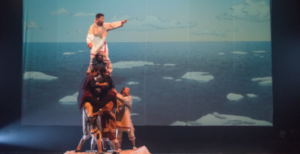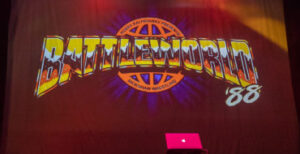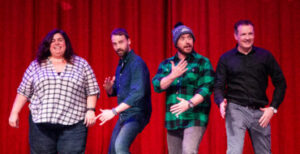
Carmen Aguirre’s brilliant monologue,
Blue Box, delves into the actor’s intriguing life as a Chilean freedom fighter. This dramatic production is also punctuated with tales of romance, salsa and phone sex. These subjects may seem disparate, but everything in the play comes down to Aguirre’s troubled relationship with two men – a dictator named Pinochet and an actor she calls
Vision Man.
General Augusto Pinochet Ugarte gained prominence in Chile in the early 1970s.The general and future dictator first served under the Popular Unity government headed by the democratic leftist, Salvador Allende. In 1973, Pinochet – a once loyal officer – was convinced by a right wing core inside the Chilean military to participate in a coup and topple Allende. In September 1973, Chile began its oppressive age under the rule of a short general with a squeaky voice, a trim moustache, sunglasses, and a penchant for uniforms decorated with colourful patriotic sashes.
In other words, Woody Allen’s stereotyped version of a dictator – minus the declaration to make everyone speak Swedish and wear underwear on the outside of one’s trousers.
Despite Pinochet’s nonthreatening and comical appearance, he was a dangerous bastard who benefited from the economic and military support given to him by such prominent western leaders as Richard Nixon and Margaret Thatcher. During Pinochet’s rule, thousands of Chilean artists, moderate leftists, trade unionists, and Marxists were imprisoned, tortured, and murdered during this horrific dictatorship which lasted until 1989.
Vision Man is an unnamed Chicano actor who Aguirre met while working on a television set. The “cinnamon-skinned” gentleman is a famous actor, who is seen on billboards and inside
petit-bourgeois journals like
People Magazine. Aguirre’s tales of her bittersweet romance with Vision Man are spliced with the actor’s dramatic adventures with the underground resistance movement in Chile. She also spends a few minutes chatting about her low paying job as a phone-sex worker on East Hastings – a section reflected upon with humour, but ending with a significant melancholic twist.
Aguirre discusses a bizarre phone-relationship with a child named Billy from the United States with poetic flourish. For example, she describes how dilated pupils can be heard whenever they open upon attraction – even over the phone.
The scariest and most effective parts of the monologue were found in Aguirre’s political reflections, but this entire performance contained a riveting element throughout. Aguirre is also an engaging performer and indulges her audience with a story chocked with Andes-high emotional ups and downs. If you hope to take the night easy, sit in the back row.
At one point in the show, Aguirre pulled-up several audience members and danced with them on stage. Aguirre also used another participant to show everyone the “Japanese way” – the manner in which political dissidents were tailed during the Pinochet years. Government agents were always inches apart from their charges, with unblinking eyes, and no sunglasses. Aguirre says the agents followed the suspect revolutionaries very close, with their clammy breath sometimes touching the back of an escaping neck.
Vancouver resident Carmen Aguirre – a prominent writer, actor and teacher – first became involved with the underground resistance movement against Pinochet when she turned 18. The Vancouver native joined the resistance through her parents, who returned to Chile from the safety of Vancouver in 1979 to fight in the Chilean revolution. Aguirre’s book
Something Fierce also details the writer’s involvement with the Chilean resistance. During CBC’s
Canada Reads contest this year, a volcano of political controversy erupted when Quebec lawyer and television personality Anne-France Goldwater referred to Aguirre as “a bloody terrorist.”
However, I’m sure even Goldwater would admit the 80 minute-long dramatic monologue is quite riveting from beginning to end, if she were to come and see
Blue Box herself.
Certainly, the Pinochet era was an oppressive period in Chilean history, where citizens spied and brutally murdered one another for ideological differences.
Aguirre frequently mentions a character named
Blue-eyed man – a neo Nazi who had been tasked to watch Aguirre after she escaped to Argentina. The Blue-eyed man also took social work courses in university to spy on other students and keep note of what was being said inside the classroom.
Every social and economic class suffered during the Pinochet years. Aguirre describes how the poor and indigenous in Chile lacked essential services. In Chilean and Argentine universities, intellectual thought was often silenced through brutal measures. A cousin studying law had been shot in the inner leg and beaten during a demonstration. The Israeli bullet from a government weapon was torn out by the authorities before the projectile’s origins could be verified.
Aguirre is first acquainted with Vision Man through a nocturnal reunion with her grandmother’s spirit. She later meets Vision man in real life on a television set. She is playing Vision Man’s mother and Vision Man is her tattooed gangsta son. Aguirre enjoys an episode of hot sex with Vision Man on Spanish Banks. They meet several times in Los Angeles, but this love affair soon destructs.
However, all things point to Aguirre finding true love in the end, and this fact is evident in the actor’s radiant and triumphant personage.
Blue Box, starring Carmen Aguirre is playing from
May 1-12, 2012 at Vancity Culture Lab at the Cultch.
To further understand the brutalities of the Pinochet regime, I also recommend reading Hugh O’Shaughnessy’s book,
Pinochet; The Politics of Torture (Latin American Bureau
,2000).
Photos of Carmen Aguirre by Itai Erdal
 Carmen Aguirre’s brilliant monologue, Blue Box, delves into the actor’s intriguing life as a Chilean freedom fighter. This dramatic production is also punctuated with tales of romance, salsa and phone sex. These subjects may seem disparate, but everything in the play comes down to Aguirre’s troubled relationship with two men – a dictator named Pinochet and an actor she calls Vision Man.
General Augusto Pinochet Ugarte gained prominence in Chile in the early 1970s.The general and future dictator first served under the Popular Unity government headed by the democratic leftist, Salvador Allende. In 1973, Pinochet – a once loyal officer – was convinced by a right wing core inside the Chilean military to participate in a coup and topple Allende. In September 1973, Chile began its oppressive age under the rule of a short general with a squeaky voice, a trim moustache, sunglasses, and a penchant for uniforms decorated with colourful patriotic sashes.
In other words, Woody Allen’s stereotyped version of a dictator – minus the declaration to make everyone speak Swedish and wear underwear on the outside of one’s trousers.
Despite Pinochet’s nonthreatening and comical appearance, he was a dangerous bastard who benefited from the economic and military support given to him by such prominent western leaders as Richard Nixon and Margaret Thatcher. During Pinochet’s rule, thousands of Chilean artists, moderate leftists, trade unionists, and Marxists were imprisoned, tortured, and murdered during this horrific dictatorship which lasted until 1989.
Vision Man is an unnamed Chicano actor who Aguirre met while working on a television set. The “cinnamon-skinned” gentleman is a famous actor, who is seen on billboards and inside petit-bourgeois journals like People Magazine. Aguirre’s tales of her bittersweet romance with Vision Man are spliced with the actor’s dramatic adventures with the underground resistance movement in Chile. She also spends a few minutes chatting about her low paying job as a phone-sex worker on East Hastings – a section reflected upon with humour, but ending with a significant melancholic twist.
Aguirre discusses a bizarre phone-relationship with a child named Billy from the United States with poetic flourish. For example, she describes how dilated pupils can be heard whenever they open upon attraction – even over the phone.
The scariest and most effective parts of the monologue were found in Aguirre’s political reflections, but this entire performance contained a riveting element throughout. Aguirre is also an engaging performer and indulges her audience with a story chocked with Andes-high emotional ups and downs. If you hope to take the night easy, sit in the back row.
At one point in the show, Aguirre pulled-up several audience members and danced with them on stage. Aguirre also used another participant to show everyone the “Japanese way” – the manner in which political dissidents were tailed during the Pinochet years. Government agents were always inches apart from their charges, with unblinking eyes, and no sunglasses. Aguirre says the agents followed the suspect revolutionaries very close, with their clammy breath sometimes touching the back of an escaping neck.
Vancouver resident Carmen Aguirre – a prominent writer, actor and teacher – first became involved with the underground resistance movement against Pinochet when she turned 18. The Vancouver native joined the resistance through her parents, who returned to Chile from the safety of Vancouver in 1979 to fight in the Chilean revolution. Aguirre’s book Something Fierce also details the writer’s involvement with the Chilean resistance. During CBC’s Canada Reads contest this year, a volcano of political controversy erupted when Quebec lawyer and television personality Anne-France Goldwater referred to Aguirre as “a bloody terrorist.”
However, I’m sure even Goldwater would admit the 80 minute-long dramatic monologue is quite riveting from beginning to end, if she were to come and see Blue Box herself.
Certainly, the Pinochet era was an oppressive period in Chilean history, where citizens spied and brutally murdered one another for ideological differences.
Aguirre frequently mentions a character named Blue-eyed man – a neo Nazi who had been tasked to watch Aguirre after she escaped to Argentina. The Blue-eyed man also took social work courses in university to spy on other students and keep note of what was being said inside the classroom.
Every social and economic class suffered during the Pinochet years. Aguirre describes how the poor and indigenous in Chile lacked essential services. In Chilean and Argentine universities, intellectual thought was often silenced through brutal measures. A cousin studying law had been shot in the inner leg and beaten during a demonstration. The Israeli bullet from a government weapon was torn out by the authorities before the projectile’s origins could be verified.
Aguirre is first acquainted with Vision Man through a nocturnal reunion with her grandmother’s spirit. She later meets Vision man in real life on a television set. She is playing Vision Man’s mother and Vision Man is her tattooed gangsta son. Aguirre enjoys an episode of hot sex with Vision Man on Spanish Banks. They meet several times in Los Angeles, but this love affair soon destructs.
However, all things point to Aguirre finding true love in the end, and this fact is evident in the actor’s radiant and triumphant personage.
Blue Box, starring Carmen Aguirre is playing from May 1-12, 2012 at Vancity Culture Lab at the Cultch.
To further understand the brutalities of the Pinochet regime, I also recommend reading Hugh O’Shaughnessy’s book, Pinochet; The Politics of Torture (Latin American Bureau,2000).
Photos of Carmen Aguirre by Itai Erdal
Carmen Aguirre’s brilliant monologue, Blue Box, delves into the actor’s intriguing life as a Chilean freedom fighter. This dramatic production is also punctuated with tales of romance, salsa and phone sex. These subjects may seem disparate, but everything in the play comes down to Aguirre’s troubled relationship with two men – a dictator named Pinochet and an actor she calls Vision Man.
General Augusto Pinochet Ugarte gained prominence in Chile in the early 1970s.The general and future dictator first served under the Popular Unity government headed by the democratic leftist, Salvador Allende. In 1973, Pinochet – a once loyal officer – was convinced by a right wing core inside the Chilean military to participate in a coup and topple Allende. In September 1973, Chile began its oppressive age under the rule of a short general with a squeaky voice, a trim moustache, sunglasses, and a penchant for uniforms decorated with colourful patriotic sashes.
In other words, Woody Allen’s stereotyped version of a dictator – minus the declaration to make everyone speak Swedish and wear underwear on the outside of one’s trousers.
Despite Pinochet’s nonthreatening and comical appearance, he was a dangerous bastard who benefited from the economic and military support given to him by such prominent western leaders as Richard Nixon and Margaret Thatcher. During Pinochet’s rule, thousands of Chilean artists, moderate leftists, trade unionists, and Marxists were imprisoned, tortured, and murdered during this horrific dictatorship which lasted until 1989.
Vision Man is an unnamed Chicano actor who Aguirre met while working on a television set. The “cinnamon-skinned” gentleman is a famous actor, who is seen on billboards and inside petit-bourgeois journals like People Magazine. Aguirre’s tales of her bittersweet romance with Vision Man are spliced with the actor’s dramatic adventures with the underground resistance movement in Chile. She also spends a few minutes chatting about her low paying job as a phone-sex worker on East Hastings – a section reflected upon with humour, but ending with a significant melancholic twist.
Aguirre discusses a bizarre phone-relationship with a child named Billy from the United States with poetic flourish. For example, she describes how dilated pupils can be heard whenever they open upon attraction – even over the phone.
The scariest and most effective parts of the monologue were found in Aguirre’s political reflections, but this entire performance contained a riveting element throughout. Aguirre is also an engaging performer and indulges her audience with a story chocked with Andes-high emotional ups and downs. If you hope to take the night easy, sit in the back row.
At one point in the show, Aguirre pulled-up several audience members and danced with them on stage. Aguirre also used another participant to show everyone the “Japanese way” – the manner in which political dissidents were tailed during the Pinochet years. Government agents were always inches apart from their charges, with unblinking eyes, and no sunglasses. Aguirre says the agents followed the suspect revolutionaries very close, with their clammy breath sometimes touching the back of an escaping neck.
Vancouver resident Carmen Aguirre – a prominent writer, actor and teacher – first became involved with the underground resistance movement against Pinochet when she turned 18. The Vancouver native joined the resistance through her parents, who returned to Chile from the safety of Vancouver in 1979 to fight in the Chilean revolution. Aguirre’s book Something Fierce also details the writer’s involvement with the Chilean resistance. During CBC’s Canada Reads contest this year, a volcano of political controversy erupted when Quebec lawyer and television personality Anne-France Goldwater referred to Aguirre as “a bloody terrorist.”
However, I’m sure even Goldwater would admit the 80 minute-long dramatic monologue is quite riveting from beginning to end, if she were to come and see Blue Box herself.
Certainly, the Pinochet era was an oppressive period in Chilean history, where citizens spied and brutally murdered one another for ideological differences.
Aguirre frequently mentions a character named Blue-eyed man – a neo Nazi who had been tasked to watch Aguirre after she escaped to Argentina. The Blue-eyed man also took social work courses in university to spy on other students and keep note of what was being said inside the classroom.
Every social and economic class suffered during the Pinochet years. Aguirre describes how the poor and indigenous in Chile lacked essential services. In Chilean and Argentine universities, intellectual thought was often silenced through brutal measures. A cousin studying law had been shot in the inner leg and beaten during a demonstration. The Israeli bullet from a government weapon was torn out by the authorities before the projectile’s origins could be verified.
Aguirre is first acquainted with Vision Man through a nocturnal reunion with her grandmother’s spirit. She later meets Vision man in real life on a television set. She is playing Vision Man’s mother and Vision Man is her tattooed gangsta son. Aguirre enjoys an episode of hot sex with Vision Man on Spanish Banks. They meet several times in Los Angeles, but this love affair soon destructs.
However, all things point to Aguirre finding true love in the end, and this fact is evident in the actor’s radiant and triumphant personage.
Blue Box, starring Carmen Aguirre is playing from May 1-12, 2012 at Vancity Culture Lab at the Cultch.
To further understand the brutalities of the Pinochet regime, I also recommend reading Hugh O’Shaughnessy’s book, Pinochet; The Politics of Torture (Latin American Bureau,2000).
Photos of Carmen Aguirre by Itai Erdal 








